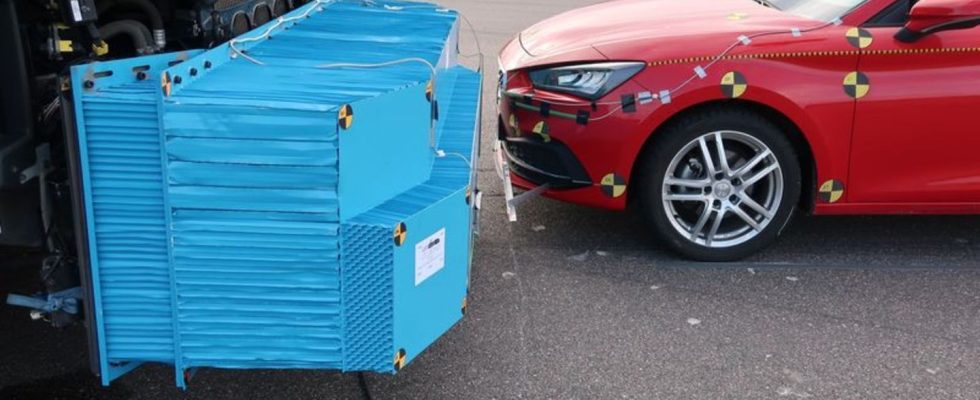Traffic
Researchers are developing a truck front that could save lives
A truck with an aluminum honeycomb front designed to protect against less devastating collisions. photo
© Trafikverket/Chalmers University of Technology/dpa
In the future, a truck front made of aluminum honeycomb could ensure that accidents between heavy trucks and cars are less devastating. The design has already proven itself in crash tests.
Collisions between heavy trucks and cars can have serious consequences for the car occupants. About the number of fatalities In order to reduce collisions, a team from the Swedish Chalmers University of Technology has now developed a new truck front that was able to reduce deformation of the car interior by 30 to 60 percent in crash tests. The more intact this interior remains, the lower the risk of injury and possibly death to the vehicle’s occupants.
As the research group explains in a statement, collisions between trucks and cars accounted for between 14 and 16 percent of all fatal accidents involving car occupants in both the EU and the USA. In over 90 percent of traffic accidents involving trucks, the other party, usually a passenger, dies.
Bigger and heavier
The Federal Statistical Office also writes in its report “Accidents involving freight vehicles in road traffic 2020” that due to the size and mass of the so-called freight vehicles, the consequences of the accident are usually significantly more severe for the other parties involved in the accident than for the freight vehicle users themselves. Of those who died in truck accidents in 2020, 7,117 were passengers in freight vehicles and 22,765 were other road users. Of those killed, 124 were passengers in freight vehicles and 492 were other road users. “The risk of being killed in a “truck accident” is therefore almost four times higher for other people involved in the accident (including passengers) than for the occupants of a freight vehicle,” the report says.
According to Swedish researchers, the most common types of accidents include head-on collisions on country roads and rear-end collisions on motorways in which the truck drives into the rear of the car in front – so that the car occupants survive, the car cabin must remain as intact as possible. But even modern cars couldn’t do that in collisions with heavy trucks.
Structure that absorbs energy
That’s why the Swedish research team has now designed a new truck front that is intended to make the impact process safer for the car occupants. In photos published by the university, the front looks like a protruding, slat-reinforced box. “The interior design of the new truck front is made of aluminum honeycomb. This is a structure made up of repeating hexagonal tubes made of aluminum foil,” explains Robert Thomson from the university’s vehicle safety department.
This structure is ideal for a light, energy-absorbing structure because around 97 percent of the volume consists of air. “Aluminum honeycombs are used in many crash test barriers to create a distributed force and absorb energy. By changing the film thickness, we can change the force and deformation characteristics,” says Thomson. In addition, the design offers the necessary flexibility in manufacturing to create prototypes and demonstrate the possibility of implementation.
During development, the research group took into account the regulations for truck dimensions that have been in force in Europe since 2019 – Decision (EU) 2019/984 – which allows longer truck cabs. The new truck front has already proven itself in crash tests: the researchers let a heavily loaded truck with the new front collide with a car at a speed of 50 kilometers per hour: In the tests, an original driving speed of 80 km/h was achieved simulated, which has been reduced by 30 km/h by automatic emergency braking systems, as required in newer cars and trucks.
According to the research group, the tests showed that the structure can reduce the deformation of the car interior by 30 to 60 percent, reducing the risk of injury to vehicle occupants. In addition, the new front also reduces the deformation of the truck in sensitive areas, which increases the safety of the truck drivers and the load.

